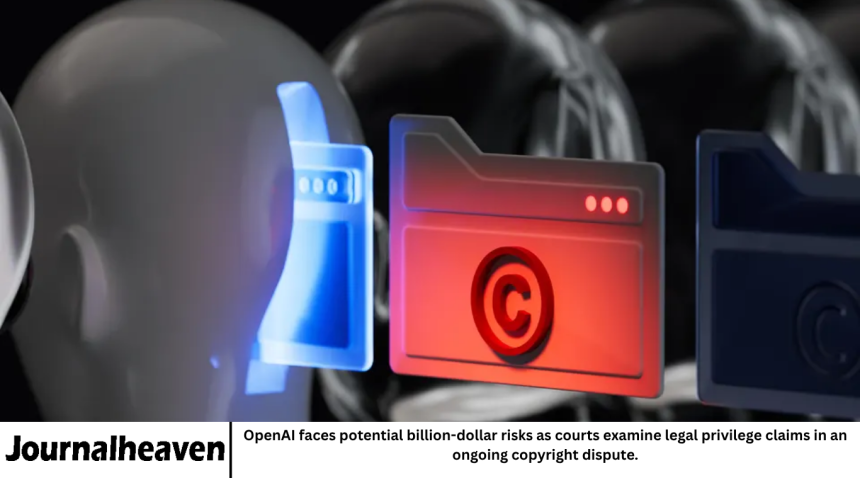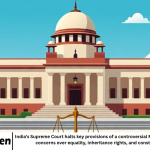OpenAI, one of the world’s leading artificial intelligence companies, is currently involved in a high-stakes legal battle over copyright. At the heart of the dispute is the question of how OpenAI uses copyrighted materials to train its AI models. The case has escalated to the courts, where judges are now weighing claims about legal privilege, potentially exposing OpenAI to billions in financial risks.
This legal challenge is not only about copyright but also about the broader implications of AI technology and the rules that govern its development. As AI becomes increasingly powerful and widespread, the outcome of this case could set important precedents for the entire industry.
Background: The Copyright Dispute Over AI Training Data
OpenAI’s models, including the widely known GPT series, are trained on vast amounts of data from the internet, books, articles, and other sources. Some of this data includes copyrighted content. The core issue is whether using copyrighted works without explicit permission for AI training constitutes infringement.
Several copyright holders have filed lawsuits alleging that OpenAI’s data collection practices violate their rights. They argue that their content was used without authorization and that AI companies must obtain licenses or pay royalties.
OpenAI defends its actions by stating that training AI models involves fair use — a legal doctrine that allows limited use of copyrighted material for purposes such as research and education. The company also claims that revealing certain internal documents related to data use could compromise trade secrets and violate legal privileges.
The Role of Legal Privilege in the Case
Legal privilege protects certain communications, especially those between lawyers and their clients, from being disclosed in court. OpenAI has argued that some documents related to its data collection and training processes are protected under this principle.
However, the plaintiffs have challenged this claim, asking courts to pierce the veil of privilege to obtain evidence that could clarify whether OpenAI’s practices were lawful. The tension between protecting company secrets and ensuring transparency for justice lies at the core of the legal dispute.
If courts decide that OpenAI must disclose these privileged documents, the company could face significant financial exposure. Conversely, upholding the privilege might limit the evidence available to copyright holders, potentially affecting the outcome.
Financial Risks and Industry Impact
Legal experts estimate that if OpenAI loses the case, the company could be liable for billions of dollars in damages and licensing fees. Beyond the direct financial impact, the ruling could force major changes in how AI companies source and use data.
Many AI developers rely on large datasets containing copyrighted materials, often scraped from the web. A precedent requiring explicit permissions or costly licenses could slow innovation and increase costs.
On the other hand, the ruling could encourage more ethical and transparent AI development practices. It may lead to new frameworks for compensating content creators fairly, balancing innovation with respect for intellectual property.
Broader Implications for AI Development
This case highlights the complex legal landscape surrounding AI and intellectual property. It raises questions about how existing laws apply to new technologies and whether new regulations are needed.
Governments and industry groups worldwide are watching closely. Some advocate for clearer AI guidelines to protect creators while fostering innovation. Others warn that overly strict regulations could stifle growth.
OpenAI’s legal battle serves as a test case for how courts interpret copyright laws in the digital age. The decisions made here could influence future AI policies and shape the industry’s evolution.
The Legal Battle So Far
The litigation has involved multiple motions, hearings, and intense legal arguments. Both sides have presented evidence and expert testimonies about AI training methods and copyright law.
OpenAI has requested courts to recognize the proprietary nature of certain documents, while plaintiffs argue that transparency is necessary to uphold copyright protections.
The courts are now tasked with balancing competing interests: protecting confidential business information and ensuring that copyright holders’ rights are not undermined.
What Happens Next?
The court’s upcoming rulings on legal privilege will be critical. If OpenAI’s claims are upheld, the company may continue its operations with less immediate legal risk, though the copyright arguments will persist.
If the courts require full disclosure, OpenAI may face increased liability and pressure to change its data sourcing practices.
Regardless of the outcome, the case will likely prompt further legal and regulatory scrutiny of AI training and copyright issues.
Frequently Asked Questions
What is the main issue in OpenAI’s copyright dispute?
The dispute centers on whether using copyrighted materials without permission to train AI models constitutes copyright infringement.
What does legal privilege mean in this case?
Legal privilege refers to protecting confidential communications between OpenAI and its lawyers from being disclosed in court.
Why do plaintiffs want privileged documents?
They believe these documents may reveal whether OpenAI’s data collection practices violated copyright laws.
How much money is OpenAI potentially at risk of paying?
Legal experts suggest the company could face billions in damages and licensing fees if it loses the case.
How could this case affect AI development?
It may require AI companies to obtain licenses for training data, increasing costs and possibly slowing innovation.
Is OpenAI claiming fair use as a defense?
Yes, OpenAI argues that training AI models qualifies as fair use under copyright law.
What will the court’s decision on legal privilege mean?
It will determine how much internal information OpenAI must share, influencing the case’s outcome and future AI transparency standards.
Conclusion
OpenAI’s copyright dispute and the related legal privilege battle represent a defining moment for the AI industry. The courts’ decisions will affect not only OpenAI’s financial future but also the rules governing AI development globally.
As AI technology continues to grow, finding a fair balance between innovation and intellectual property rights remains essential. The outcome of this case will help shape that balance for years to come.








